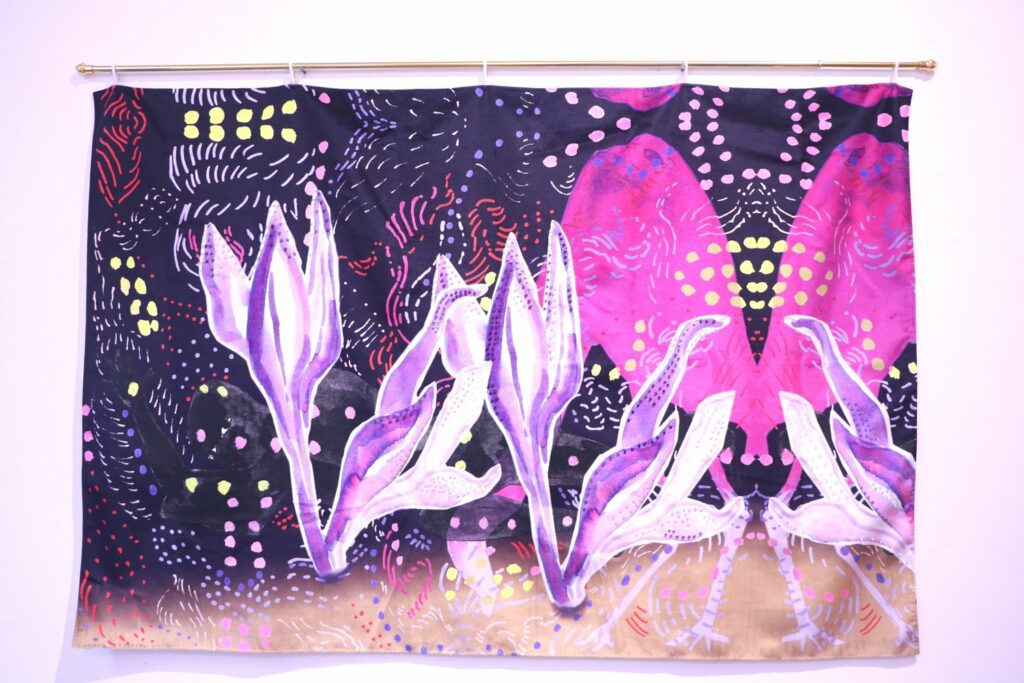Art at a Time Like This , Online
15 May 2023 - 15 May 2024

Oneika Russell, Myth 1, 2021 Bead embroidered, laser-printed, faux velvet wall hanging App. 54’ x 60’
Rupture is a psychic and physical experience- a fracturing- that perhaps is not meant to be repaired. It holds the tension between societal and emotional dismantling alongside the emergence of generative possibilities. Rupture signals a fundamental undoing, often associated with (and yet not totally constituted by) violence. Indeed, the contemporary Caribbean has been shaped through the ruptures of settler colonialism, Trans-Atlantic slavery, and ruinous Western economic policies. Rupture: Interventions of Possibility engages the work of six artists of Jamaican descent grappling with the difficult realities and imaginative potential that arise in this undoing, gesturing to what has been and what can be. Working across photography, drawing, painting, video, sound, textiles, performance, and multimedia installation, these participants – Katrina Coombs, Zachary Fabri, Timothy Yannick Hunter, Zinzi Minott, Oneika Russell, and Shoshanna Weinberger – present a critically rich landscape where rupture is explored on multiple levels, contending with both socio-cultural and emotional impacts. Thinking with Jamaican novelist and cultural theorist Sylvia Wynter, each artist employs practices that move “outside of the consolidated field of our present mode of being/feeling/knowing,” towards forging spaces of possibility.
Timothy Hunter manipulates digital images, texts and sounds to create diasporic archives of layered, fragmented histories. His practice considers how we create history and meaning from conditions of cultural and social vulnerability. Oneika Russell’s video and textile work complicates the tropical, tourist imaginary of the Caribbean while examining the interrelationships between humans and the natural environment, blurring the boundaries between truth and myth. Her storytelling workshops activate the personal memories of participants. Zinzi Minott’s artworks also investigate the contours of memory. In her 2022 work, Bloodsound, an installation that includes prints, videos, sound and sculpture, she explores the political implications and consumption of Black sonic practices. Glitch techniques are manipulated in her videos as a metaphor for the multilayered effects of racism on the mind and body.
In his performances, videos and mix-media images, Zachary Fabri negotiates the materiality of anti-Black conditions and embodied experiences of catharsis, while considering the maneuvers of Black life. Katrina Coombs’ large-scale and process-intensive fiber-based sculptural installations are animated through performance, addressing the multiplicity of the female body as a site of power and loss. More recent work emphasizes the icon of the maternal figure and the experiences of miscarriages, abortion and stillbirth. Shoshanna Weinberger’s drawings and paintings on paper wrestle with racialized and social body politics, creating images that break open notions of femininity while questioning the continued forms of violence against Black people in the afterlife of slavery.
The exhibition is informed by a historical understanding that the creation of cultural lives in the Caribbean have manifested in fragmented and hybrid practices, much of which was formed in the context of plantation violence, indentureship and forced and voluntary migration of diverse populations to the region. A self-conscious claim in the symbolism of fragmentation, improvisation and hybridity has been integral to the formation of modern Caribbean thought, echoed in the work of the region’s artists and intellectuals. In grappling with the continuous presence of colonial histories and racial oppression, artists have sought to suture and reconfigure a world wounded by the splinters of catastrophe while also affirming the dignity and humanity of the people of the region.
Rupture signifies a foundational undoing, not simply modification of current systems. Building a world to affirm equity and interrogate oppression necessitates radical change, as recognized by scholar and activist Ella Baker who expressed this as, “getting down to and understanding the root cause.” Critical theorist Denise Ferreira da Silva extends Baker’s proposition, recognizing that reconstruction does not equate to, “reparation or a restitution of a monetary sum,” but as an, “unknowing and undoing of the World that reaches its core”. Likewise, each artist in Rupture attends to the mechanisms of undoing, reconstituting meaning through fracture to imagine more expansive and intentional possibilities for living.
View the online exhibition HERE.
Rupture: Interventions of Possibility is a collaboration between Art At Times Like This and Jamaica Art Society In Focus Fellows 2022 and was curated by Gervais Marsh and Petrina Dacres.
ABOUT THE CURATORS
Gervais Marsh, Ph.D., is a writer, scholar and curator whose work is deeply invested in Black life, concepts of relationality and care, rooted in Transnational Black feminist theory and praxis. Their research explores the generative possibilities of difficult intimacies in the work of Black queer visual and performance artists. Their writing has been published in Hyperallergic, C Magazine, The Brooklyn Rail, ARTS.BLACK and Nka: Journal of Contemporary African Art, among others. They are an editor with Ruckus Journal and recent curatorial projects include Denzil Hurley’s To be pained is to have lived through feeling at Canada gallery, Robert Paige’s Patterns of Progress at Hyde Park Art Center and the Jamaica Art Society virtual exhibition Rupture: Interventions of Possibility. They grew up in Kingston, Jamaica, a home that continues to shape their understanding of self and relationship to the world.
Link to website: https://www.gervaismarsh.com/ Instagram @blackofcentre
Dr. Petrina Dacres is a curator and educator on contemporary Caribbean and African Diaspora art and visual culture. She has organized exhibitions at The Clemente Soto Vélez Cultural & Educational Center, New York, The National Museum, Jamaica, the National Gallery of Jamaica, and the International Studio and Curatorial Program. Dr Dacres is also a founding member of Tide Rising Art Projects, an organization created to support and promote contemporary Caribbean art and film. She is Head of the Art History Department at the Edna Manley College of the Visual and Performing Arts in Kingston, Jamaica. Her research focuses on the art and politics of memory in the Caribbean, memorials and monuments and on violence and heroic iconography in contemporary art. Her recent publication includes, “Survival Stories through Portrait Painting: A Conversation with Alicia Brown.”
Instagram @lulu_dacres @tiderisingartprojects